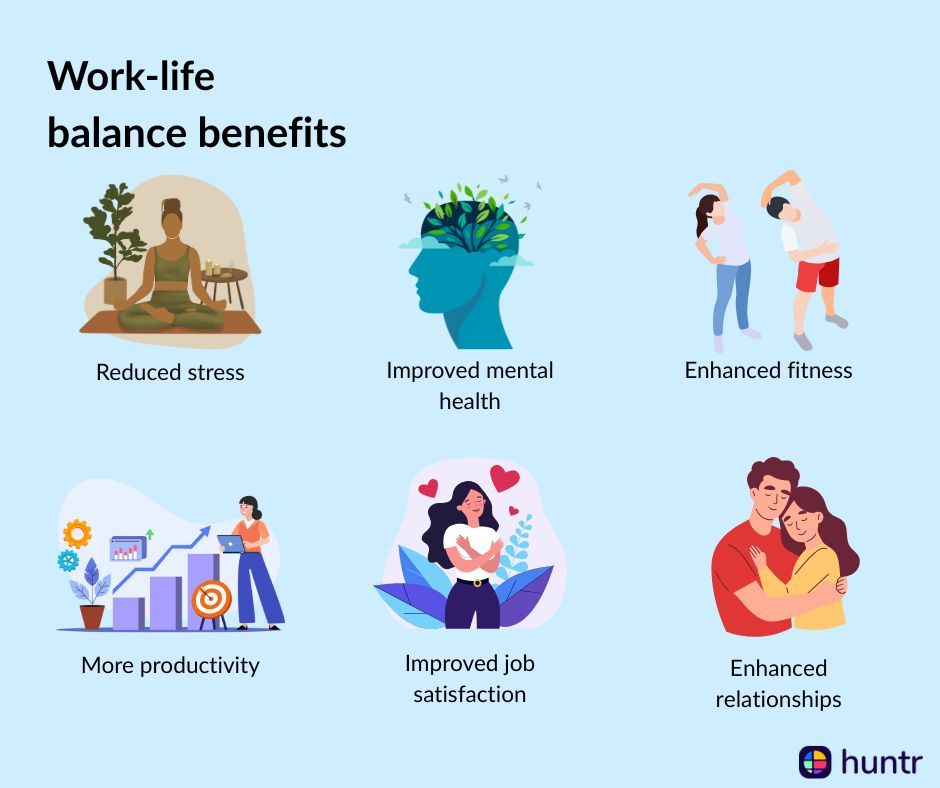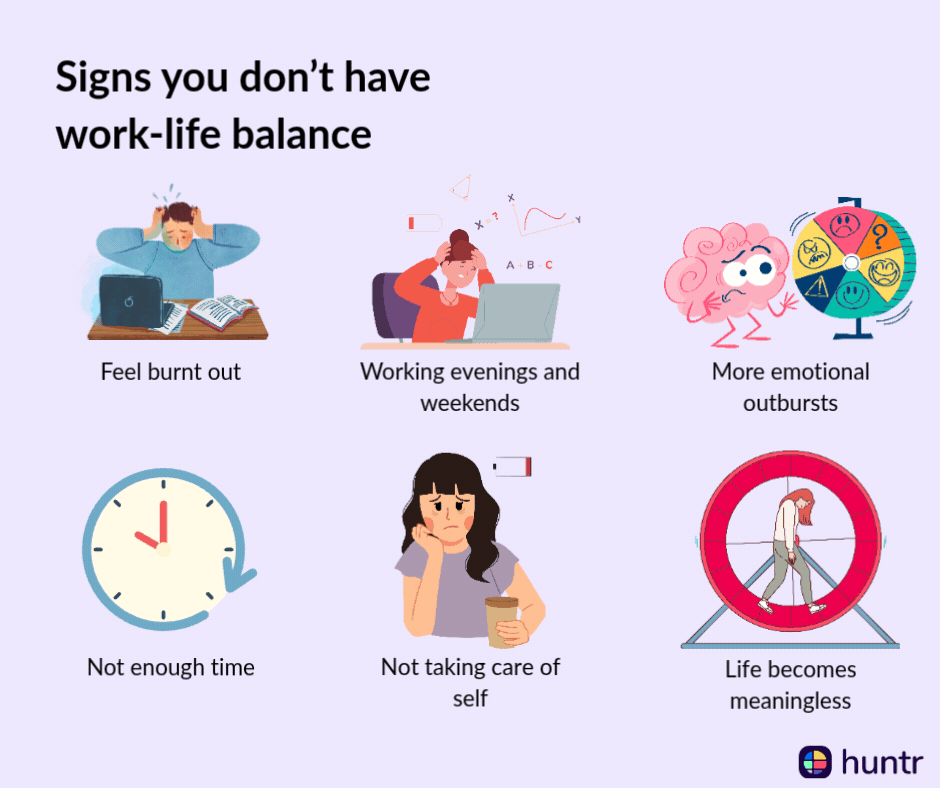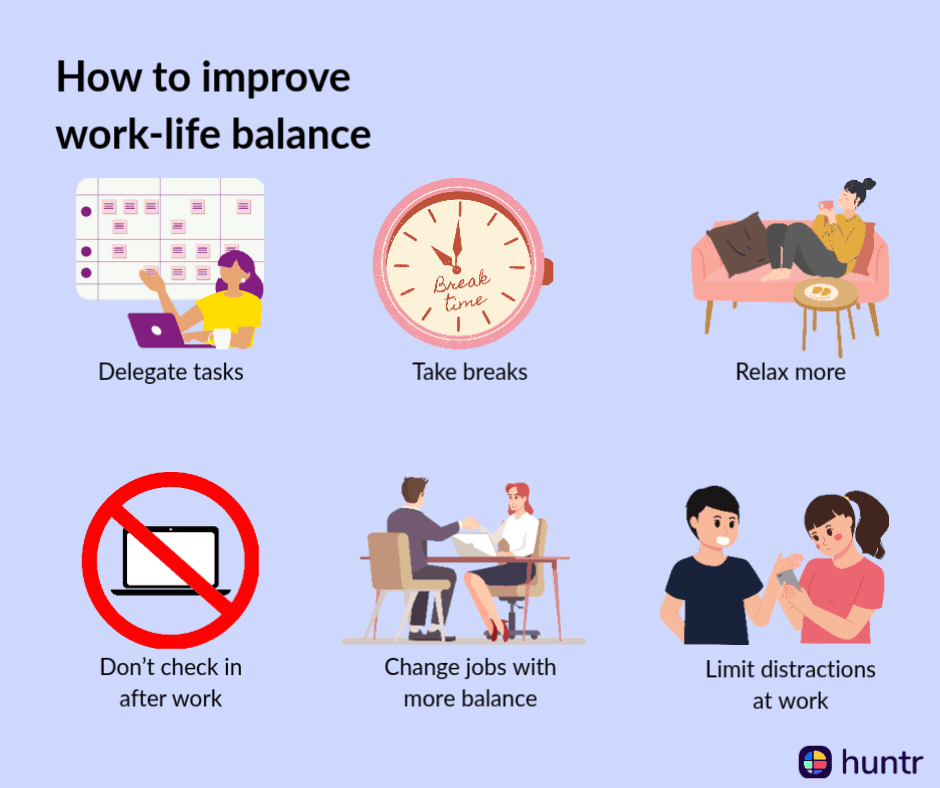Huntr Blog
How to Improve Work-Life Balance and Signs You Don’t Have It Yet
December 26, 2023
Having a good work-life balance doesn’t need to be something to dream about. You can have a great life and healthy work routine where you get a good blend of the best of both worlds. There may be times where you prioritize more life than work and times where maybe you’re not getting enough work in. The beauty of work is that it challenges you, keeps your brain sharp, helps you meet new people, and gives you opportunities to learn and grow. The magic of life is that there are so many wonderful places to visit, activities to try, hobbies to learn, and people to meet. Having a good work-life balance is about balancing the good from both these things to live an enriching life. In this article, we’re going to share how to improve work-life balance and signs you don’t have it.
Achieve better work-life balance
Use Huntr's resume builder to help you land a new job with more balance.

Signs You Don’t Have Work-Life Balance
1. You feel burned out
Work leaving you feeling kinda exhausted, overwhelmed, and just straight up burned out lately? It may be a sign that you don’t have work-life balance. Often, we feel burned out when we work for too long with not enough breaks. Running on empty will usually lead to burn out. It’s important to recharge yourself with breaks during the work day, such as taking that lunch break. Or by resting on evenings or weekends. Finding time for yourself or your hobbies can be a good way to unwind without feeling burned out or overburdened. If all you have energy for one day is sitting in front of the TV and watching shows for two hours then do that. If you need to turn off your brain by playing video games for an entire day on the weekend, then do what works best for you.
2. You’re working evenings and weekends
Working too hard on evenings and weekends can create a ton of work-life imbalance. It’s one of the clearest signs you don’t have work-life balance too. People often take work home with them to avoid stuff at home. Maybe if they work late, they won’t have to have that awkward conversation with their spouse. Or maybe if they work weekends, they’ll prove their worth and alliance to their employer. All work, no play doesn’t usually pan out. If you’re working evenings and weekends because you’re avoiding something in your life, the things you care about in your life will slowly disappear. You weren’t born to be destined to a lifetime of hustle. Find the magic in the world around you, at home, with family and friends, or out in nature.
3. You’re having more emotional outbursts
When more people are commenting on your outbursts, making statements like “You’ve been so angry lately, is everything okay?” or “You seem tense today” it’s usually a sign of work-life imbalance. When our emotions are imbalanced, it’s often because so is our life. Having good work-life balance means you’re working hard for the challenge of it but you’re giving yourself time to rest and relax. If you’re working a bit too hard, you’ll be more likely to have angry outbursts. Maybe you feel like you can’t relax because your business isn’t doing too well, it's a busy season at work, or you’re trying to prove yourself. But often, it’s those who take breaks and recharge who perform better.
4. You feel like you don’t have enough time
When time feels like it’s limited and you don’t have enough of it, it usually means you’re working too much. Life isn’t all about work. Ending the work day at normal times will actually help you become more productive. Sometimes, finishing work isn’t the problem but what we do at home is. For example, a new or busy parent might not have a lot of time for his or herself after work as taking care of the kids becomes the focus leaving them drained. In these cases, finding time to yourself will be crucial. The best way to do this is ensure that you and your partner divide the workload at home evenly, so that you don’t overburden each other with your absence for the occasional night out.
5. You’re not taking care of yourself
One of the signs of work-life imbalance is you stop taking care of yourself. If you’re working or relaxing too hard, you might stop exercising, eating well, and might end up with poor sleep. When our lives are balanced with both work and play, we develop a healthy routine that involves eating well, exercise, and good sleep hygiene. When you notice your exercise and eating habits are a bit off, it’s time to get back to developing a routine that involves those things. Most people think that having a good diet and exercise routine are about looking good and being healthy, but it’s also about taking care of your brain. People who take care of themselves will have better cognitive function and mental health, which helps them balance their work lives and personal lives better.
6. Life feels meaningless
Most of the time when we don’t have work-life balance it’s because we’re working more than living. However, if we’re living more than working, believe it or not, life starts to feel meaningless. You’d think the opposite would happen, however, work gives our lives meaning. When people retire or take a year off to travel, at some point, things start to become boring. You get stuck in a rut that results in all play, no work. Our mental stimulation deteriorates. Our lack of a challenge disappears. And so, we begin to experience depression, as if “Is this really all I wanted all along?” We often overhype a world where we don’t have to work at all. Keep in mind that even billionaires work full-time jobs. You could have all the money, success, and time in the world, but it really is a balance of both work and life that enriches your life.

How to Improve Work-Life Balance
1. Understand that work isn’t the priority in life
You can improve work-life balance by understanding that work isn’t the thing to prioritize in life. Understanding that work is there to help you pay bills, experience things in the world, and keep your brain sharp but isn’t supposed to take up your whole life is an important lesson. Most of us work multiple jobs, and it’s true that the cost of living is high and that it can be hard to make ends meet. Balancing work-life balance is necessary even if the reason why we work hard is to be able to pay bills on time. Finding alternatives like getting higher paying jobs or cutting costs on luxury items can give us back more of our time from needing to work to merely get by and survive. Life flashes past you really fast when working multiple jobs. It’s almost like you blink and suddenly see how much life you’ve missed out on.
2. Delegate tasks to others
You can fix work-life balance by delegating more tasks to others. For example, if you find you’re not spending enough time at home, you might delegate work tasks to your peers. That way, you can spend more time at home with your family because it’ll be easier to finish work on time. Alternatively, if you’re overburdened with household chores at home, you might delegate more tasks to your partner or children. Instead of saying, “Can you help me with [task]” try saying something like “Can you do your part by doing [task]?” When you ask for help with a household chore, it makes it seem like the burden of the task is on that one person’s shoulders when it should be a family effort. Approaching work and home life with a team dynamics mindset will be a game-changer for helping you improve work-life balance, so you can actually take breaks and rest without feeling overwhelmed in all of your day-to-day responsibilities.
3. Take breaks to invest in yourself
You’ll see work-life balance improvements when you take breaks to invest in yourself. During the work day, you should consider taking breaks, particularly at lunch to step away from your workstation to relax your brain. Often, when we work during lunch, we might accomplish more tasks in the day, but we’ll leave work feeling utterly exhausted. And when you leave work exhausted, the last thing you have time for are the people in your household who want your love and attention. If all day, you’re sitting in meetings at work, you probably won’t have the mental energy to talk to your family at home. So, taking breaks at work can allow you to recharge those batteries a bit.
4. Fill your weekends with relaxing activities
Making your weekends your source of fun or relaxation while still contributing to the household is crucial to having a good work-life balance. If during the week, you’re usually too tired to do things around the house, consider making Friday night the day you do laundry, tidy up, and manage any household tasks or errands. When you do these things on Friday night, it frees up your weekend to go to that family member’s wedding, take your kid’s to a friend’s birthday party, host a family game night, or actually take the day off to relax. By making Friday night your chores night, you truly get a weekend to go to fun events, relax, and give your energy to the people you care most about without overburdening anyone with chores.

5. Don’t check your phone or laptop after work
An easy way to improve work-life balance is to keep your work devices off when not at work. It seems harmless to check your Slack or email in bed but it really does end up creating this world where there’s no clear divide between your work and home life. And when there’s no divide, it’s easier for that work-life imbalance to creep in. Checking Slack notifications gives people the same rush that checking social media notifications gives you. And that can cause the unhealthy work-life balance you’re trying to resolve. Removing work emails and Slack from your phone can allow you to wake up without checking your device to give you a bit of separation between your work life and home life.
6. Limit distractions at work
In the opposite direction, limiting distractions regarding your home world while at work is also important. While at work, you don’t want to be checking your phone for text messages from your partner nor do you want to spend hours doomscrolling on social media. Browsing the internet for non-work related tasks only results in you becoming less productive at work. When you’re less productive at work, the lines between your work and home life become blurred increasing the likelihood of an imbalance.
7. Change jobs
One of the easiest ways to improve work-life balance is to leave your job. If your current job requires too much time from you beyond your 40 hour work week, you can choose to work for a different company that has better work-life balance. Maybe they offer flexible hours, have a culture of clocking out at 5, or four day work weeks that allow you to have a better way of experiencing more balance in your life. If you’re looking to change jobs, you can use a tool like Huntr to organize your job search, create a resume and cover letter from beautifully-designed templates, and apply to more jobs faster with autofill applications.
8. Work from home more often
While the lines of work and life can be blurred by working from home, often when we need to improve work-life balance a quick fix is to work remotely instead. This gives us the ability to manage home responsibilities if needed, such as picking up a sick child from school. Alternatively, it can be a great way to cut out time commuting in case that’s the reason why it’s hard to make it home in time for dinner now and then. Having a structure that allows you to go to the office if needed can be a great way to keep the lines better divided. Yet, if life happens during the work week, working from home can be an alternative that helps you skew the balance more on the life side. It doesn’t need to be a perfect 50-50 all the time, it just needs to feel more or less balanced overtime.
9. Improve your relationships
When work and life are imbalanced we often have to dig deep into the emotional root of what’s happening. Maybe you’re spending more time at the office to avoid hard conversations with the family. Or maybe it’s the opposite and you’re spending more time at home, avoiding awkward run-ins with coworkers. You can’t spend your whole life running away from people or hiding out from them. Ultimately, coming up with a game plan to figure out how to resolve a situation at home or at work will help you communicate better, get your needs met, and ultimately move on with the next step of your life. If you find your work and life are imbalanced, the best way to improve it is to take some time to reflect on where things went wrong and try to find a happy fix or ending depending on what’s best for your specific situation.
Will changing jobs improve work-life balance?
Changing jobs can be an effective way to improve work-life balance. If you’ve been thinking of changing companies or roles, you can update your resume and cover letter using a tool like Huntr. You can also use Huntr to keep track of all your interviews, application documents, and more. To update your resume, sign-up for Huntr today.
Get More Interviews, Faster
Huntr streamlines your job search. Instantly craft tailored resumes and cover letters, fill out application forms with a single click, effortlessly keep your job hunt organized, and much more...
AI Resume Builder
Beautiful, perfectly job-tailored resumes designed to make you stand out, built 10x faster with the power of AI.
Next-Generation Job Tailored Resumes
Huntr provides the most advanced job <> resume matching system in the world. Helping you match not only keywords, but responsibilities and qualifications from a job, into your resume.
Job Keyword Extractor + Resume AI Integration
Huntr extracts keywords from job descriptions and helps you integrate them into your resume using the power of AI.
Application Autofill
Save hours of mindless form filling. Use our chrome extension to fill application forms with a single click.
Job Tracker
Move beyond basic, bare-bones job trackers. Elevate your search with Huntr's all-in-one, feature-rich management platform.
AI Cover Letters
Perfectly tailored cover letters, in seconds! Our cover letter generator blends your unique background with the job's specific requirements, resulting in unique, standout cover letters.
Resume Checker
Huntr checks your resume for spelling, length, impactful use of metrics, repetition and more, ensuring your resume gets noticed by employers.
Gorgeous Resume Templates
Stand out with one of 7 designer-grade templates. Whether you're a creative spirit or a corporate professional, our range of templates caters to every career aspiration.
Personal Job Search CRM
The ultimate companion for managing your professional job-search contacts and organizing your job search outreach.

